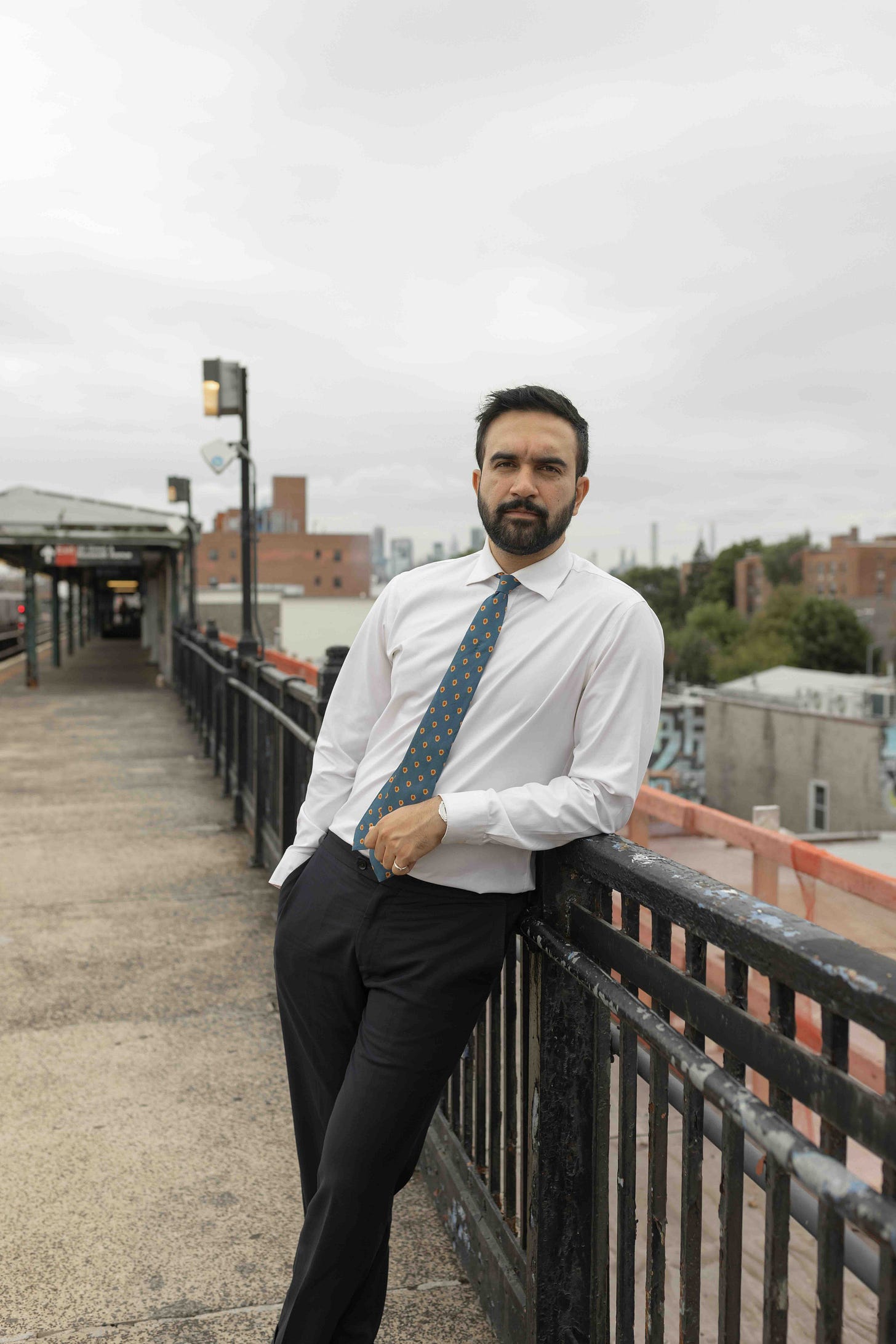New York Times Race-Polices Zohran Mamdani Using Stolen Property
Plus, Harvard steers Iranians toward weaker U.S. border checkpoints; Iraq smuggles Iranian oil

The Editors are no fans of Zohran Mamdani, to put it mildly. But we’re no fans of the New York Times, either. The Times scoop that when Mamdani applied to Columbia in 2009 he checked the “Black or African American” box on the application deserves more skeptical treatment than it has so far generally received.
First, it demonstrates breathtaking hypocrisy by the Times. When, during the 2024 presidential campaign, Donald Trump questioned Kamala Harris’s racial self-identification, the Times attacked him for it. The Times called it “ugly” and “divisive.” Here is how the Times handled it in a news analysis subheadlined “White America has long sought to define racial categories — and who can belong to them.”:
“I didn’t know she was Black until a number of years ago when she happened to turn Black and now she wants to be known as Black. So I don’t know, is she Indian or is she Black?” Mr. Trump said of Ms. Harris, whose mother was Indian American and whose father is Black.
The moment was shocking, but for those who have followed Mr. Trump’s divisive language, it was hardly surprising. The former president has a history of using race to pit groups of Americans against one another, amplifying a strain of racial politics that has risen as a generation of Black politicians has ascended.
The audacity of Mr. Trump, a white man, questioning how much a Black woman truly belongs to Black America was particularly incendiary.
And it evoked an ugly history in this country, in which white America has often declared the racial categories that define citizens, and sought to determine who gets to call themselves what.
“Give me a break,” said Fred Sweets, a contributing editor at The St. Louis American who watched the discussion from the third row. “He seemed to be denigrating her background. She knows who she is.”
Yet now that it’s not President Trump doing the race-policing of Kamala Harris but the New York Times doing the race-policing of Zohran Mamdani, instead of being “incendiary,” “ugly,” or “divisive,” it’s just New York Times journalism. It’s almost like the Times has a double standard where it calls President Trump racist for doing things that the Times does itself. Either the Times owes Trump an apology or it owes Zohran Mamdani an apology, but any attempt to justify why Trump’s comment is really a lot worse than the Times article seems pretty strained. Maybe I am missing some fine distinction.
Second, the Times attributes its scoop to “internal data derived from a hack of Columbia University that was shared with The New York Times.” Under Article 165 of New York state penal law, “A person is guilty of criminal possession of stolen property in the fifth degree when he knowingly possesses stolen property, with intent to benefit himself or a person other than an owner thereof.” Whether the “data” amount to “property” and whether the Times having it “shared with” amounts to “possession” are questions for lawyers, but beyond the legal questions is an ethical question of whether it’s right for the New York Times to knowingly use stolen property— “hack”— is a euphemism the Times uses to describe the crime of breaking into a computer system without authorization—to make profits for the New York Times.
Maybe the right move here of the New York Times isn’t to publish the stolen information but to return it to Mamdani or Columbia and call the police to report the cybercriminal. Sure, news organizations are generally in the business of sharing information with the public rather than assisting the police.
But imagine if someone hacked into the New York Times human resources computer system and obtained racial data on its job applicants from 2009. And then imagine that person showed up at, say, National Review or the New York Post and announced, “hey, I broke into the New York Times human resource computer system illegally, here are the racial boxes checked by successful and unsuccessful Times job applicants in 2009, with names attached, go publish a story based on that and sell ads and subscriptions against it.”
Most people are probably pretty clear that knowingly accepting, say, a stolen car and then using it to make money by operating it as an Uber is not okay. But when it’s information rather than a car that is stolen, somehow people don’t see it as clearly. Perhaps one difference is that the goal with the information is not solely profit but there is also some altruistic goal of informing the public about issues of genuine public policy concern. There may be some instances where the end of informing the public about a matter of grave and urgent concern justifies the means of knowingly accepting stolen property, but it isn’t entirely clear to me that Mamdani’s race box for a 2009 unsuccessful college application is one of those instances.
Frequently, the person who steals the information puts it in a plain white envelope and mails it to the newsroom, giving the newsroom the ability, at least ostensibly, to contend that it does not know the information was actually stolen. That doesn’t appear to be the case in this particular example, where the Times concedes that the information was hacked.
Harvard steers Iranians toward weaker U.S. border checkpoints:
From a Crimson article about an “hour-long Zoom webinar was led by Harvard International Office immigration services director Maureen Martin and by Jason Corral, a staff attorney at the Harvard Representation Initiative, a Harvard Law School clinic that provides free immigration consultation to Harvard affiliates”:
Corral said that some international students have told the HRI that the customs process at Logan is stricter than other entrance points — including New York’s John F. Kennedy International Airport, O’Hare International Airport in Chicago, and the Los Angeles International Airport. The HRI has been instructing Iranians to avoid Logan altogether, Corral said during the meeting.
Why is Harvard steering incoming Iranians toward border-screening sites with weaker standards? If one of those Iranians turns out to be a terrorist who gets into America because Harvard directed them to a checkpoint with less “strict” security, the blood will be on Harvard’s hands. It sure looks as if Harvard’s International Office has a severe case of clientitis—the false impression that it exists to serve the interests of the foreign students rather than the interests of Harvard University or of American national security.
The Crimson has turned off its comments function, but if it still were on, I might urge the reporters to engage with some additional curiosity the question of whether this is appropriate advice for Harvard to be giving.
Iraq smuggles Iranian oil: The U.S. Treasury Department has put out a graphic about what it describes as an “Iran-Iraq Oil Smuggling Network.”
From the Treasury announcement:
Iraqi-British national Salim Ahmed Said (Said) runs a network of companies that have been selling Iranian oil falsely declared as Iraqi oil since at least 2020. Said’s companies use ship-to-ship transfers and other obfuscation techniques to hide their activities. Said’s companies and vessels blend Iranian oil with Iraqi oil, which is then sold to Western buyers via Iraq or the United Arab Emirates (UAE) as purely Iraqi oil using forged documentation to avoid sanctions. This allows the oil to be sold on the legitimate market and helps Iran evade international sanctions on its oil exports.
Said has bribed many members of key Iraqi government bodies, including parliament. He has reportedly paid millions of dollars in kickbacks to these officials in exchange for forged vouchers allowing him to sell Iranian oil as if it originated from Iraq. …
In 2023, Said expanded his business holdings to include VS Oil Terminal FZE (VS Oil), which, though registered in the UAE, has its physical presence in Khor al-Zubayr, Iraq. VS Oil manages six oil storage tanks where Iranian oil is dropped off to be mixed with Iraqi oil. Vessels carrying Iranian oil also conduct ship-to-ship transfers with vessels carrying Iraqi oil in the vicinity of VS Oil’s terminal facilities, and the blended oil is ultimately authenticated by complicit Iraqi government officials. Vessel tracking data shows that multiple oil tankers known to transport Iranian petroleum products on behalf of U.S.-sanctioned Iranian oil and petrochemical broker Triliance Petrochemical Co. Ltd. and Iranian military front company Sahara Thunder have visited VS Oil. VS Oil employees smuggle hard currency into Iran via cars and trucks, some of which carry millions of dollars each, as payment for oil.
One of the potential positives of a regime change in Iran is that it could curb the corrupt influence of Iran on Iraq and increase the likelihood of Iraq emerging as a constructive and more independent international player rather than an Iranian satellite. Absent Iran, there’s no reason, for example, that Iraq shouldn’t join the Abraham Accords. Anyway, kudos to Treasury Secretary Bessent and his team for exposing this operation, which apparently funneled cash to the Iranian regime that is supporting terrorism and oppressing its own people.
Know someone who would enjoy or benefit from reading The Editors? Please help us grow by forwarding this email along with a suggestion that they subscribe. Or send a gift subscription:




The US government has known about laundering of Iranian oil through Iraq at least as far back as 2012, though it was not revealed at the time.
Harvard Crimson comments have not disappeared entirely. Just replace www in the URL with api. This works for old articles where comments were posted. I haven’t tried using the comments on new articles, but if we spread the word about the api URLs it could be good to resurrect the comments on Crimson articles.